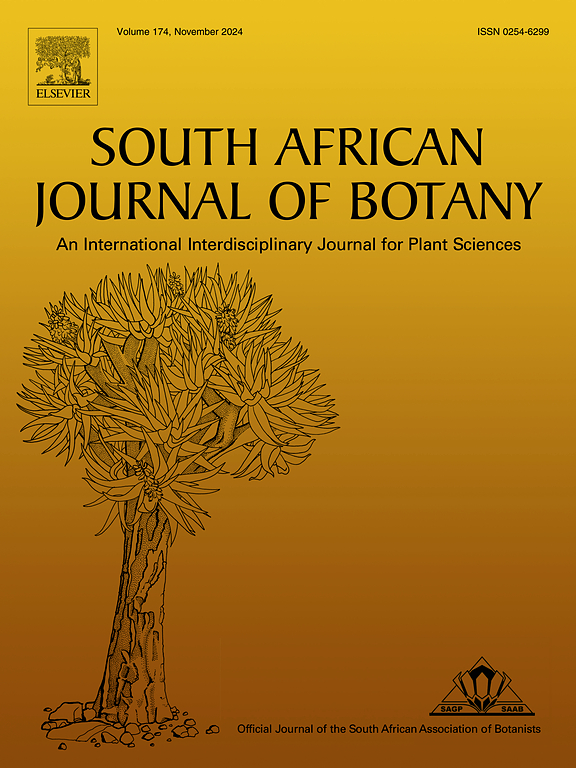大麻二酚作为抗大肠杆菌O157:H7的潜在抗生物膜和抗群体感应剂
IF 2.7
3区 生物学
Q2 PLANT SCIENCES
引用次数: 0
摘要
大肠杆菌O157:H7是一种主要的食源性病原体,能够形成生物膜,并对抗菌素表现出越来越强的耐药性。这种日益增长的耐药性强调了对新策略的需求,促使人们对大麻二酚(CBD)等替代药物产生兴趣,大麻二酚是一种具有抗菌潜力的非精神活性大麻衍生物。研究了大麻二酚(CBD)对大肠杆菌O157:H7的细菌增殖、生物膜发育和群体感应(QS)活性的影响。采用微量肉汤稀释法和微量滴度板(MtP)法分别测定了CBD的抗菌性能和抗生物膜性能。此外,通过分析亚mic浓度下蜂群运动的减少来评估其群体感应抑制(QSI)能力。采用实时定量反转录PCR (RT-qPCR)方法对群体感应相关基因的转录谱进行定量分析。与环丙沙星相比,CBD的MIC和MBC值在5mg /mL到20mg /mL之间,抗菌效力有限。MtP试验显示,CBD使大肠杆菌O157:H7分离株的生物膜产量降低了50%,并显著下调了20 mg/mL时pfs的表达(p <;0.019)。CBD对luxS表达的影响不显著(p> 0.05)。总之,这些发现突出了CBD作为抗生物膜和抗qs剂对抗大肠杆菌O157:H7的潜力。本文章由计算机程序翻译,如有差异,请以英文原文为准。
Cannabidiol as a potential anti-biofilm and anti-quorum sensing agent against Escherichia coli O157:H7
Escherichia coli O157:H7 is a major foodborne pathogen capable of forming biofilms and exhibiting increasing resistance to antimicrobials. This growing resistance underscores the need for new strategies, prompting interest in alternative agents such as cannabidiol (CBD), a non-psychoactive cannabis derivative with antimicrobial potential. This study investigated the influence of cannabidiol (CBD) on E. coli O157:H7 in terms of bacterial proliferation, biofilm development, and quorum sensing (QS) activity. CBD's antimicrobial and anti-biofilm properties were determined using the broth microdilution technique and the microtiter plate (MtP) assay, respectively. Additionally, its quorum sensing inhibitory (QSI) capability was assessed by analyzing the reduction in swarming motility at concentrations sub-MIC. The transcriptional profiles of quorum sensing-related genes were quantified using real-time quantitative reverse transcription PCR (RT-qPCR) methodology. MIC and MBC values for CBD ranged from 5 mg/mL to 20 mg/mL, with limited antimicrobial potency compared to ciprofloxacin. The MtP assay revealed that CBD reduced biofilm production of E. coli O157:H7 isolates by up to 50 % and significantly downregulated pfs expression at 20 mg/mL (p < 0.019). The effect of CBD on luxS expression was insignificant (p> 0.05). In conclusion, these findings highlight CBD’s potential as an anti-biofilm and anti-QS agent against E. coli O157:H7.
求助全文
通过发布文献求助,成功后即可免费获取论文全文。
去求助
来源期刊

South African Journal of Botany
生物-植物科学
CiteScore
5.20
自引率
9.70%
发文量
709
审稿时长
61 days
期刊介绍:
The South African Journal of Botany publishes original papers that deal with the classification, biodiversity, morphology, physiology, molecular biology, ecology, biotechnology, ethnobotany and other botanically related aspects of species that are of importance to southern Africa. Manuscripts dealing with significant new findings on other species of the world and general botanical principles will also be considered and are encouraged.
 求助内容:
求助内容: 应助结果提醒方式:
应助结果提醒方式:


